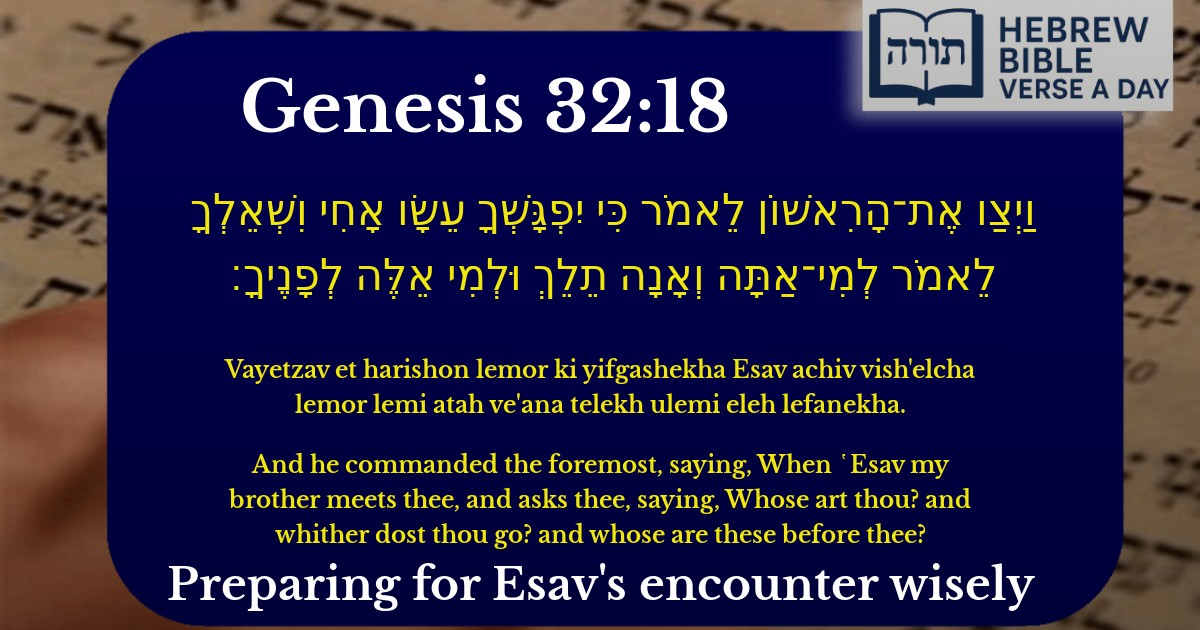Join Our Newsletter To Be Informed When New Videos Are Posted
Join the thousands of fellow Studends who rely on our videos to learn how to read the bible in Hebrew for free!
Hebrew Text
וַיְצַו אֶת־הָרִאשׁוֹן לֵאמֹר כִּי יִפְגָּשְׁךָ עֵשָׂו אָחִי וִשְׁאֵלְךָ לֵאמֹר לְמִי־אַתָּה וְאָנָה תֵלֵךְ וּלְמִי אֵלֶּה לְפָנֶיךָ׃
English Translation
And he commanded the foremost, saying, When ῾Esav my brother meets thee, and asks thee, saying, Whose art thou? and whither dost thou go? and whose are these before thee?
Transliteration
Vayetzav et harishon lemor ki yifgashekha Esav achiv vish'elcha lemor lemi atah ve'ana telekh ulemi eleh lefanekha.
Hebrew Leining Text
וַיְצַ֥ו אֶת־הָרִאשׁ֖וֹן לֵאמֹ֑ר כִּ֣י יִֽפְגׇשְׁךָ֞ עֵשָׂ֣ו אָחִ֗י וּשְׁאֵֽלְךָ֙ לֵאמֹ֔ר לְמִי־אַ֙תָּה֙ וְאָ֣נָה תֵלֵ֔ךְ וּלְמִ֖י אֵ֥לֶּה לְפָנֶֽיךָ׃
וַיְצַ֥ו אֶת־הָרִאשׁ֖וֹן לֵאמֹ֑ר כִּ֣י יִֽפְגׇשְׁךָ֞ עֵשָׂ֣ו אָחִ֗י וּשְׁאֵֽלְךָ֙ לֵאמֹ֔ר לְמִי־אַ֙תָּה֙ וְאָ֣נָה תֵלֵ֔ךְ וּלְמִ֖י אֵ֥לֶּה לְפָנֶֽיךָ׃
🎵 Listen to leining
Parasha Commentary
📚 Talmud Citations
This verse is not quoted in the Talmud.


Context of the Verse
This verse (Bereshit 32:18) describes Yaakov Avinu's preparations before meeting his brother Esav. After years of separation, Yaakov anticipates a potentially hostile encounter and strategically instructs his servants on how to respond to Esav's questions. The verse reflects Yaakov's wisdom in diplomacy and his efforts to avoid conflict.
Yaakov's Instructions to the Servants
Rashi explains that Yaakov divided his camp into two groups (as mentioned in the previous verse) and gave specific instructions to the first group. The three questions Yaakov anticipates from Esav are:
Yaakov's Diplomatic Approach
The Ramban (Nachmanides) notes that Yaakov's response plan was designed to appease Esav by emphasizing humility and submission. By instructing his servants to say the animals were a gift "to my lord Esav" (as seen in the following verses), Yaakov sought to diminish any perception of threat or rivalry.
Midrashic Insights
The Midrash (Bereshit Rabbah 75:8) highlights that Yaakov's preparations reflect his understanding of Esav's nature. The three questions parallel Esav's worldview:
Spiritual Lessons
The Kli Yakar (R' Shlomo Ephraim of Luntschitz) teaches that Yaakov's actions model the principle of hishtadlut (human effort within divine providence). Despite Hashem's promise of protection (Bereshit 32:9-13), Yaakov took practical steps to ensure safety, demonstrating that trust in Hashem does not negate responsible action.